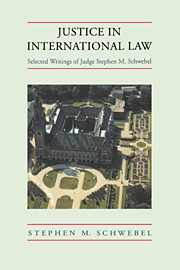Book contents
- Frontmatter
- Contents
- Preface
- PART I International Court of Justice
- PART II International Arbitration
- 10 Arbitration and the Exhaustion of Local Remedies (with J. Gillis Wetter)
- 11 Arbitration and the Exhaustion of Local Remedies Revisited
- 12 Some Aspects of International Law in Arbitration Between States and Aliens
- 13 The Majority Vote of an International Arbitral Tribunal
- 14 The Prospects for International Arbitration: Inter-State Disputes
- PART III United Nations
- PART IV International Contracts and Expropriation
- PART V Aggression under, Compliance with, and Development of International Law
- List of publications
- Index
14 - The Prospects for International Arbitration: Inter-State Disputes
Published online by Cambridge University Press: 06 November 2009
- Frontmatter
- Contents
- Preface
- PART I International Court of Justice
- PART II International Arbitration
- 10 Arbitration and the Exhaustion of Local Remedies (with J. Gillis Wetter)
- 11 Arbitration and the Exhaustion of Local Remedies Revisited
- 12 Some Aspects of International Law in Arbitration Between States and Aliens
- 13 The Majority Vote of an International Arbitral Tribunal
- 14 The Prospects for International Arbitration: Inter-State Disputes
- PART III United Nations
- PART IV International Contracts and Expropriation
- PART V Aggression under, Compliance with, and Development of International Law
- List of publications
- Index
Summary
Introduction
I wish to congratulate Ambassador Pinto on his excellent paper on The Prospects for International Arbitration of Inter-State Disputes. His survey is scholarly, graceful, and enlightening; his analysis is stimulating; and his prescriptions, if modest and measured, make sense.
Before proceeding to comment further on Ambassador Pinto's paper, I should like to say a word about the remark of a previous speaker about the inflexibility of Professor Verzijl. I would rather emphasize his adherence to legal principle. His principled approach is illustrated by his performance as President of the French–Mexican Claims Commission. As President, Professor Verzijl declined to indulge endless delaying tactics. He rightly and courageously asserted the cardinal principles of international arbitration and international law that “the unilateral refusal of a State to recognize a regularly appointed umpire in the regular performance of his functions is contrary to international law” and that “yielding” to such “an illegal attitude would amount to disregarding the general principle of law according to which no one may take advantage, in his own favor, of the non-fulfilment of his engagements.”
I understand Ambassador Pinto's essential thesis to be this. International arbitration between States was in its origins a diplomatic as well as a judicial process. The critical component of its diplomatic character was the authority of the Arbitral Tribunal to adjudge not only on the basis of law but of equity. The Arbitral Tribunal was entitled not only to decide between a winner and a loser but to arrive at a judgment in which both parties were winners or both losers but in any event in which a measure of compromise between conflicting interests was struck.
- Type
- Chapter
- Information
- Justice in International LawSelected Writings, pp. 223 - 230Publisher: Cambridge University PressPrint publication year: 1994



